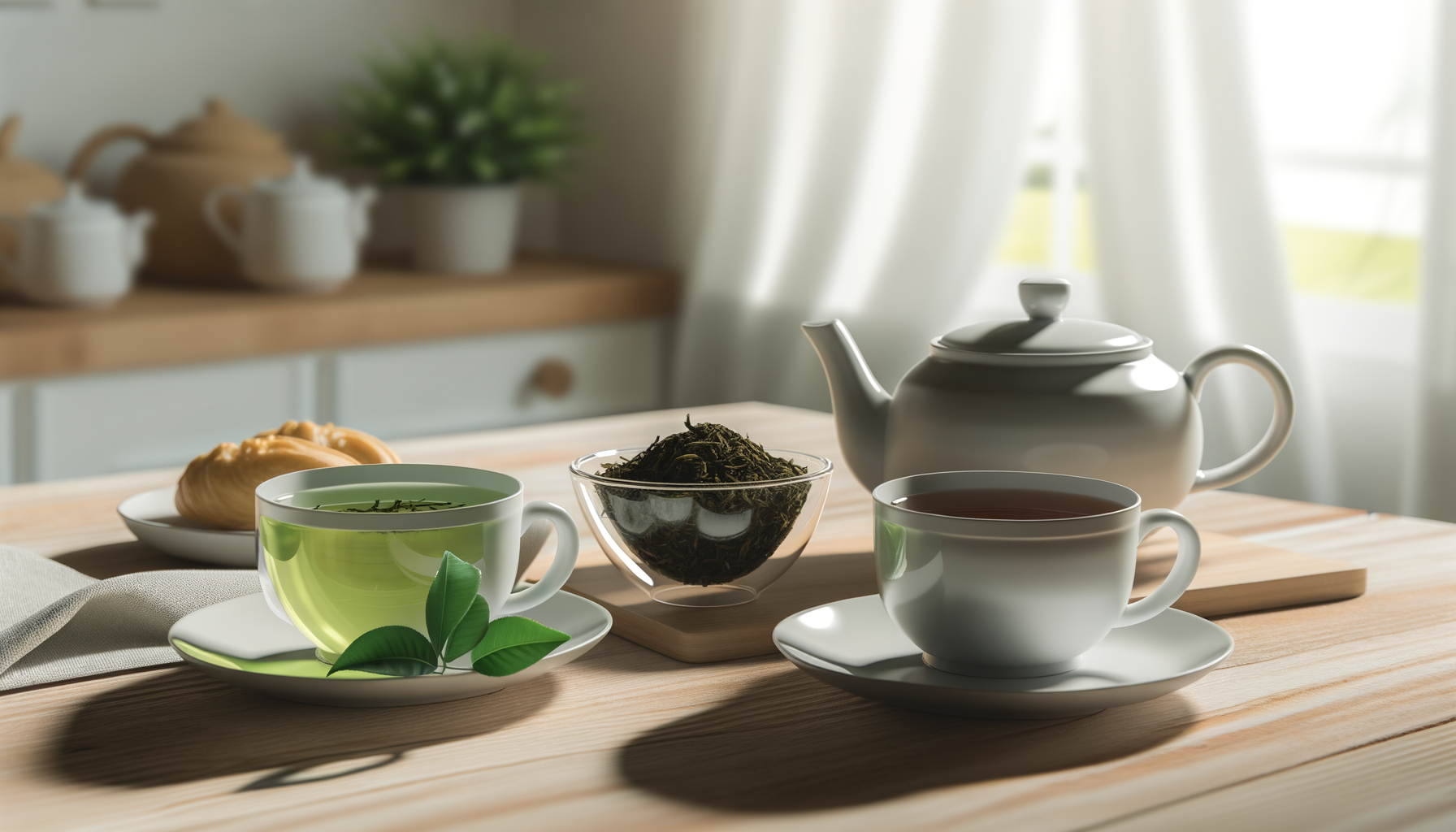
Green vs Black Tea Health Benefits: Which Brew Reigns Supreme?
Ever stood in the tea aisle, wondering whether to reach for green or black tea? You're not alone! Both of these beloved brews have been sipped for centuries, each boasting a unique profile of flavors and health benefits. But when it comes to your wellness journey, is one truly superior to the other? Let's dive into the world of green and black tea, exploring their distinct characteristics and how they can contribute to your daily health routine. Get ready to uncover the secrets in your teacup!
The Origins and Processing of Green and Black Tea
Did you know that both green and black tea come from the same plant? It's true! The Camellia sinensis plant has been cultivated for thousands of years, with its origins tracing back to ancient China. The key difference lies in how these leaves are processed after harvesting.
Green tea leaves are quickly heated to prevent oxidation, preserving their natural color and delicate flavor. This process results in a lighter, more vegetal taste that many tea enthusiasts adore. On the other hand, black tea leaves are allowed to fully oxidize, turning them dark and creating that rich, bold flavor we associate with classic breakfast teas.
The processing methods don't just affect flavor – they also impact the nutrient content. Green tea retains more of its original antioxidants, while black tea develops unique compounds during oxidation. It's fascinating how such different teas can come from the same plant, isn't it?
Antioxidant Power: Comparing Green and Black Tea
When it comes to antioxidants, both green and black teas pack a powerful punch. Green tea is renowned for its high levels of catechins, particularly epigallocatechin gallate (EGCG). These potent antioxidants have been linked to various health benefits, including improved heart health and potential cancer-fighting properties.
But don't count black tea out! During oxidation, its catechins transform into theaflavins and thearubigins. While different from green tea's antioxidants, these compounds are equally impressive. They've been associated with reduced inflammation and improved cardiovascular health.
So, which tea should you choose for antioxidant benefits? The truth is, both are excellent options. Why not enjoy a variety and reap the benefits of both types of antioxidants?
Caffeine Content: Energy Boost Comparison
Need a pick-me-up? Both green and black tea can give you that energy boost you're looking for, but in slightly different ways. Black tea typically contains more caffeine, with about 14-70 mg per 8-ounce cup. Green tea, on the other hand, usually has 12-50 mg per cup.
While black tea might give you a quicker jolt, green tea offers a more sustained energy boost. This is partly due to its L-theanine content, which we'll discuss more later. For those sensitive to caffeine, green tea might be a gentler option.
Remember, everyone's caffeine tolerance is different. Pay attention to how your body responds and adjust your tea consumption accordingly.
Weight Management: Can Tea Help?
If you're looking to manage your weight, incorporating tea into your routine might be beneficial. Green tea, in particular, has been studied for its potential to boost metabolism and increase fat burning. Its catechins may help enhance the effects of fat-burning hormones like norepinephrine.
Black tea also shows promise in this area, but through a different mechanism. Recent studies suggest it may promote the growth of beneficial gut bacteria linked to lean body mass. Plus, both teas are calorie-free when consumed plain, making them an excellent alternative to sugary drinks.
However, it's important to note that tea isn't a magic weight loss solution. It's most effective when combined with a balanced diet and regular exercise. Think of it as a helpful addition to your overall healthy lifestyle!
Heart Health: Cardiovascular Benefits of Both Teas
Your heart will thank you for that daily cuppa! Both green and black teas have been associated with improved cardiovascular health. They may help lower LDL cholesterol (the "bad" kind) and reduce blood pressure, two key factors in heart disease risk.
Green tea's catechins have been shown to improve blood flow and reduce inflammation in blood vessels. Black tea's theaflavins, on the other hand, may help improve the function of blood vessels and reduce the risk of plaque buildup.
For optimal heart health benefits, aim for 3-5 cups of tea per day. But remember, moderation is key – too much caffeine can have negative effects on your heart rhythm.
Mental Clarity and Cognitive Function
Ever noticed how a cup of tea can help you feel more alert and focused? That's not just the caffeine at work. Both green and black teas contain L-theanine, an amino acid that promotes relaxation without drowsiness.
When combined with caffeine, L-theanine can improve cognitive performance, enhancing both attention and memory. Green tea typically contains more L-theanine than black tea, which may explain its reputation for promoting a state of "calm alertness."
Additionally, the antioxidants in both teas have shown potential neuroprotective properties. They may help protect brain cells from damage and could potentially reduce the risk of age-related cognitive decline.
Digestive Health: Soothing Properties of Tea
Feeling a bit unsettled after a meal? A cup of tea might be just what you need. Both green and black teas contain tannins, which can have a soothing effect on the digestive system. These compounds may help reduce inflammation and alleviate symptoms of digestive discomfort.
Black tea, in particular, has shown potential prebiotic effects. This means it may help nourish the beneficial bacteria in your gut, promoting overall digestive health. Green tea, with its anti-inflammatory properties, may also help soothe an upset stomach.
Remember, while tea can be beneficial for digestion, it's best to avoid drinking it on an empty stomach if you're prone to acid reflux or stomach sensitivity.
Oral Health: Surprising Benefits for Your Smile
Here's something to smile about – your tea habit might be good for your teeth! Both green and black teas contain fluoride, which can help strengthen tooth enamel and prevent cavities. They also have antibacterial properties that may help fight off the bacteria responsible for bad breath and tooth decay.
However, it's worth noting that both teas, especially black tea, can stain teeth over time. To minimize staining, consider drinking through a straw or rinsing your mouth with water after enjoying your tea.
Also, be mindful of adding sugar or honey to your tea, as these can negate the oral health benefits. For the best results, enjoy your tea unsweetened or with a sugar-free sweetener.
Conclusion
When it comes to green vs. black tea health benefits, it's clear that both brews bring a wealth of goodness to your cup. While green tea might edge out in antioxidant content, black tea holds its own with unique compounds that support overall wellness. The best choice? It might just be to enjoy both! Alternate between green and black tea throughout your day to reap the diverse benefits each has to offer. Remember, the healthiest tea is the one you enjoy drinking regularly. So, steep, sip, and savor your way to better health, one delightful cup at a time!


